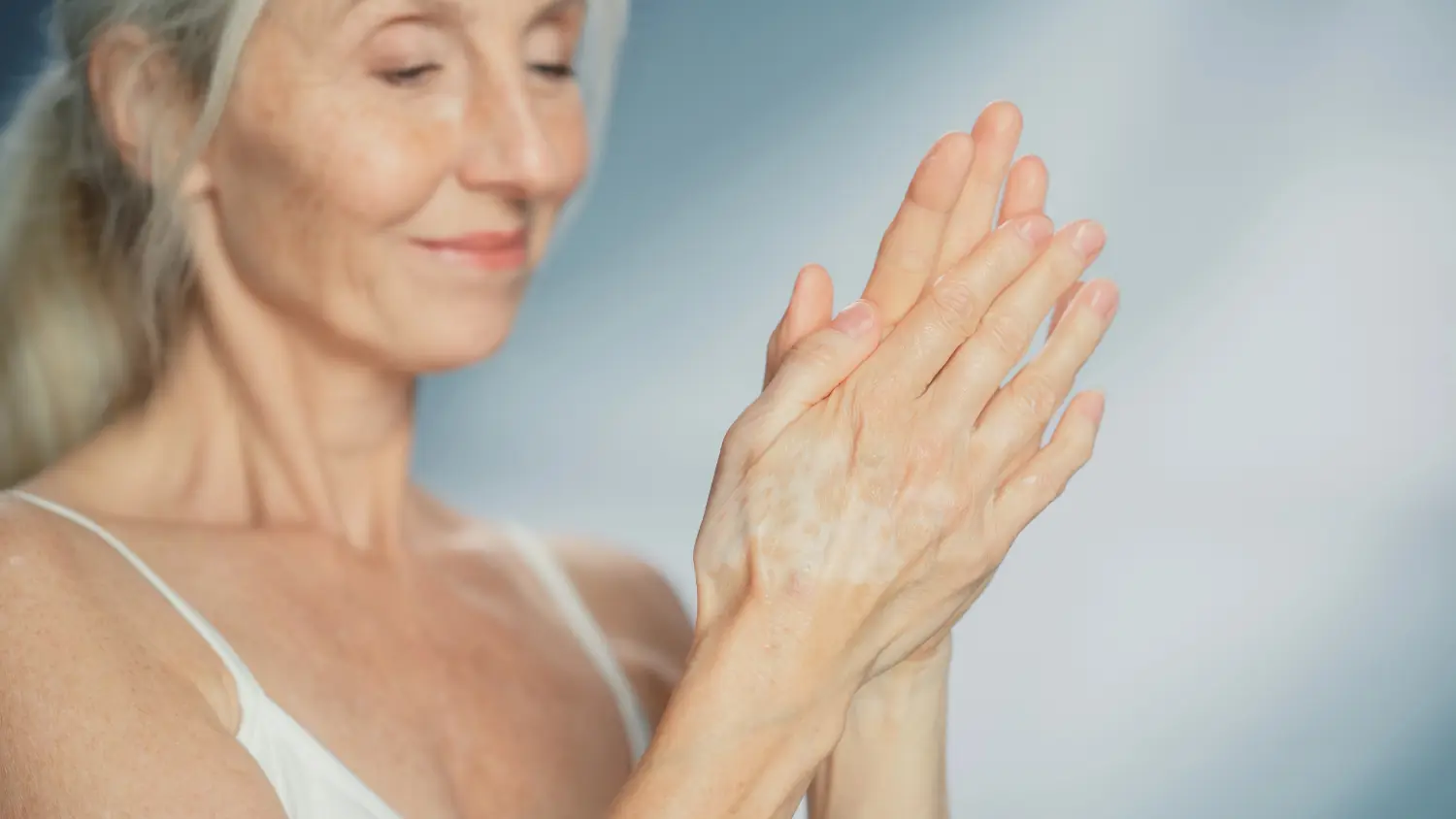
Menopause brings many changes to the body, and one of the most common, and frustrating, is skin dryness.
During menopause, the skin loses moisture, elasticity, and its ability to retain hydration, leading to dryness, irritation, and fine lines. But with the right skincare routine, hydration strategies, and lifestyle adjustments, you can keep your skin feeling soft and nourished.
Menopause-related skin dryness is primarily caused by hormonal changes, particularly the decline in estrogen levels. Estrogen plays a key role in maintaining skin hydration by stimulating the production of collagen, natural oils, and hyaluronic acid, all essential for keeping the skin plump and moisturized. When estrogen drops, the skin’s ability to retain moisture decreases, leading to dryness, tightness, and increased sensitivity.
In addition to hormonal shifts, menopause slows down cell turnover, meaning dead skin cells accumulate more easily, making the skin appear dull and flaky. The skin’s protective barrier also weakens, making it more susceptible to environmental damage and dehydration. Combined with external factors like harsh weather, hot showers, and the natural aging process, these changes contribute to persistent dryness.
A well-structured skincare routine can help replenish lost moisture and strengthen your skin’s protective barrier. When choosing products to manage skin dryness during menopause, look for hydrating and nourishing ingredients that support moisture retention.
Harsh soaps and foaming cleansers can strip the skin of natural oils. Instead, opt for a creamy or oil-based cleanser with ingredients like glycerin or ceramides to cleanse without over-drying.
Serums packed with hyaluronic acid, peptides, and niacinamide help draw moisture into the skin and improve elasticity. Apply a serum after cleansing to boost hydration levels.
Choose a moisturizer with ceramides, shea butter, or squalane to restore the skin’s lipid barrier. Products containing collagen-boosting ingredients, such as retinol or peptides, can also help improve skin texture over time.
UV exposure accelerates moisture loss and skin aging. A broad-spectrum SPF 30 or higher protects against further damage and prevents dehydration.
Steer clear of alcohol-based toners, sulfates, and strong exfoliants, as they can worsen dryness and irritation. Instead, use gentle exfoliators like lactic acid to remove dead skin cells without stripping moisture.

Skincare products can help externally, but proper hydration and nutrition are just as important to manage skin dryness during menopause from the inside out. The right diet and hydration habits can improve your skin’s ability to retain moisture and maintain its elasticity.
Hydration starts from within. Aim for at least 8 glasses of water daily to keep your skin cells plump and hydrated. Herbal teas and water-rich foods like cucumbers and watermelon can also contribute to your daily intake.
Omega-3 fatty acids found in salmon, flaxseeds, and walnuts help strengthen the skin barrier and reduce inflammation. These healthy fats support natural oil production, preventing excessive dryness.
Fruits and vegetables rich in vitamins A, C, and E, such as berries, spinach, and bell peppers, help fight free radical damage and support collagen production, improving skin texture and moisture retention.
Collagen peptides, vitamin C, and hyaluronic acid supplements can enhance skin hydration from within. Always consult with a healthcare professional before adding new supplements to your routine.
Nourishing your body with the right foods and plenty of water can make a noticeable difference in your skin’s hydration levels.
Beyond skincare and nutrition, certain lifestyle habits can help manage skin dryness during menopause by preventing moisture loss and improving overall skin health. Small changes in your daily routine can make a big difference in keeping your skin hydrated and resilient.
Dry indoor air, especially in winter, can strip moisture from your skin. Using a humidifier in your bedroom or living space adds moisture to the air, helping to keep your skin from drying out overnight.
Hot water can weaken the skin’s barrier and strip away natural oils, making dryness worse. Opt for lukewarm showers and limit them to 10–15 minutes to prevent excessive moisture loss.
Quality sleep allows the skin to repair itself overnight. Aim for 7–9 hours of rest each night to support collagen production and overall hydration. Sleeping on a silk or satin pillowcase can also reduce friction and prevent moisture loss.
Chronic stress can increase cortisol levels, which may worsen skin dryness and sensitivity. Incorporating relaxation techniques like meditation, yoga, or deep breathing exercises can help maintain a balanced, healthy complexion.
Regular exercise boosts circulation, ensuring that oxygen and nutrients reach your skin cells. Activities like walking, swimming, or yoga can promote skin hydration and elasticity.
By making these simple lifestyle adjustments, you can further protect your skin from menopause-related dryness.
Menopause-related skin dryness is a common but manageable issue. By understanding the hormonal changes affecting your skin, adopting a hydrating skincare routine, and making smart lifestyle choices, you can keep your skin soft, nourished, and healthy.
Key Takeaways:
By taking a holistic approach, you can effectively combat dryness and maintain a radiant complexion throughout menopause and beyond. Looking for menopause-friendly skincare products? Explore CellaMD’s skincare solutions to find formulas tailored for your skin’s needs.
Related Articles










* These statements have not been evaluated by the Food and Drug Administration. This product is not intended to diagnose, treat, cure or prevent any disease.